Publications & Comments
available now
African Education: Engine for Our Liberation, Appendix E – Pro-Creation & Familybuilding – Abridged Edition
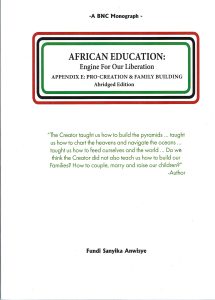
African Education: Engine for Our Liberation, Appendix E – Pro-Creation & Familybuilding – Abridged Edition
“The Creator taught us how to build the pyramids … taught us how to chart the heavens and navigate the oceans … taught us how to feed ourselves and the world … Do we think the Creator did not also teach us how to build our Families? How to couple, marry and raise our children?” – Author
With this writing we hope to continue, with others, helping to restore African Family building to its proper place of primacy in the Liberation of Our People – Our Return to Righteous Living & Sovereignty.
African Educational teaching on this subject is diametrically opposed to and significantly different from the prevailing European teaching. Under “normal” circumstances, the education and socialization of our children would, of necessity and tradition, seek to teach, and aim to develop, righteous attitudes toward Family, including mate selection, courtship, marriage, parenting and grandparenting, and the role of the village-community (which is the assemblage of Families of African proverb that it takes to raise our youth). Today, it is even more critical as there is an intensified and all-out assault against righteous African behavior in this area. Our People – our children being the most vulnerable, with (a) non-African sex education virtually mandated in Euro/EuroAmerican schools, and (b) “the popular culture” reaching levels of toxicity unprecedented in the contemporary era – need talking points and strong reinforcement to counter this hegemony in our own minds and behavior. (97 Pages)
The African Personality: Lubrication for Liberation – Can African People Get Along? A Primer On Conflict Management
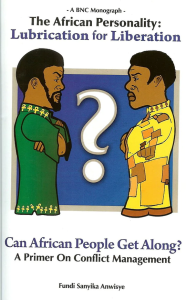
The African Personality: Lubrication for Liberation – Can African People Get Along? A Primer On Conflict Management
The African Personality: Lubrication for Liberation posits the inevitability of conflict in all relationships and proposes that preparing for conflict in advance – as we would prepare for rain or any other inevitable event – renders conflict more manageable. A conflict management protocol, a productive spiritual-affective orientation and specific communication ingredients are explored as means to minimize antecedent conflict-causing and conflict-exacerbating friction.
The author suggests: “Molding a personality equipped with conflict resolution skills and the general ability to share, cooperate, act collectively and respond to the needs of others is stressed in the true African curriculum because unless egos, insecurities and petty conflict can be ‘checked at the door,’ there is little hope for real progress toward freedom for our people.” (39 pages)
African Education: Engine For Our Liberation (Isahluko 1)
“In our Return to Righteous Living and Sovereignty, we are teaching something we have been taught against learning. We are not just teaching our students about Africa – we are teaching them to be African.” – Author
Coming after the author’s Education for Liberation/CIBI at 30 (2002) and CIBI’s Work (2011, 2014) Isahluko 1 (Part 1) of this monograph continues reinforcing the preparation and lifelong fortification of worker-warriors for our Return to Righteous Living & Sovereignty as the purpose of African Education. It touches on some of the components of African Education – from its spiritual-cultural and sociopolitical content to the development of commitment, character, cooperation, collective work & responsibility, honesty & integrity, empathy, self-discipline, a strong work ethic, academic-cognitive-technical fervor, conflict management skills, and Family building skills, including those needed for mate selection, courtship, marriage and effective parenting. (68 Pages)
Coming back soon
(Temporarily out of stock)
Blessings Not Curses: Countering the Deleterious Effects of Profanity on the African (Black) Community
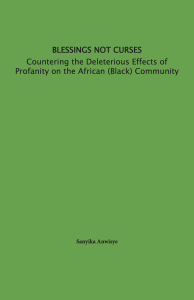
Blessings Not Curses: Countering the Deleterious Effects of Profanity on the African (Black) Community
From our Home Page: This book (2003) asserts that the profanity used or accepted by too many in our community (a) is not African, not Maatic, (b) runs afoul of the high calling of MdwNtr and other African spiritual revelations on the power of words to define, transform and elevate a society, (c) originates from the spirit and languages of the colonizers-and-enslavers of Our People, (d) compromises our spiritual strength and spiritual potential by polluting our spiritual environment, (e) is an insidious, largely unacknowledged and insufficiently-addressed encumbrance and contravention to our Liberation efforts … and (f) must be abandoned – and clean speech reinstituted and expressions of blessings increased – in order to make real progress on our road back to Righteous Living & Sovereignty. (280 Pages)
African Education: Engine for Our Liberation, Isahluko 2
This book and its several appendices continue from Isahluko 1 (isiZulu: Part 1) and address: procreation and Family building (in Appendix E: Pro-Creation & Familybuilding, separately printed and available – see above); the distinction between African Education and African themed curricula; more on parental responsibility; culture and beauty standards; outstanding mathematics and science taught and on display; external and internal challenges to African Education, including to both its customary village-institutions and its Homeschools; financing, perpetuating, expanding and defending village-institutions and a global system; where African Education can be taught and where it cannot; a brief prognosis on synergistic action among seemingly disparate settings promoting African Education; and more. Only available as a set paired with, or with prior purchase of, or otherwise having received, Isahluko 1. (110 Pages)
TV’s Talking But We Don’t Have to Listen: An Analysis and Alternatives for Africans
First published in 1983, the 25th Anniversary Edition (2008) provides a helpful update section. Though largely discussing television, it offers analyses and recommendations for understanding and countering the effects of the Euro-American media-entertainment industry and the need for African People to create/re-create our own media for information and inner-attainment. In her 1979 monograph, Should Television Be The Primary Educator of Our Youth?, Niani Kilkenny, media analyst, concludes that television is “the ruling class’ most important tool for promoting their ideology” and is “(European) society’s dominant propaganda machine.” Haki Madhubuti, director of Chicago’s Third World Press, wrote in his 1978 book, Enemies: The Clash of Races, that television is “the most dangerous weapon of the Twentieth Century.” In January 1980, Bilalian News reported that, “Some educators believe that too much television may be responsible for tired, (academically non-striving) students who resent homework and are nervous and antisocial.”
Television: a weapon, a propaganda machine, a liability to academic performance? What are the bases for such strong assertions? Can television affect cognitive development? Does it have the potential to influence the spiritual-cultural-political attitudes and behaviors of people? If so, how? This brief offering examines these questions, particularly as they relate to African People. (67 Pages)

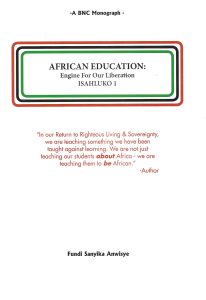
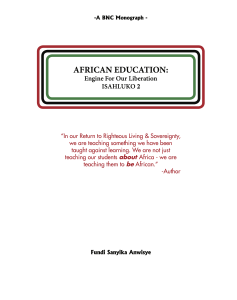
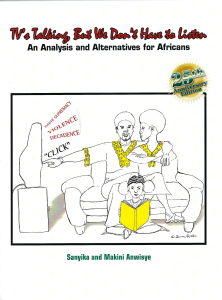
Mzee Jawanza Kunjufu
Baba Sanyika Anwisye has provided us an excellent blueprint for resolving conflict from an Africentric perspective. He has challenged all of us to go beyond a superficial understanding of Africentricity and the Nguzo Saba. I believe Anwisye’s analysis that one of our greatest problems is not just the external enemy but the one within. Every family and organization serious about their growth and development should read The African Personality: Lubrication for Liberation.
Mzee Mwalimu K. Bomani Baruti
Baba Sanyika Anwisye’s The African Personality: Lubrication for Liberation is a basic, spiritually-based guide for gaining and maintaining peace among individuals and groups within a community under assault. It is a commonsensical handbook full of often forgotten but timeworn guidelines for resolving interpersonal and intergroup conflict. In addition to outlining the admirable humanizing qualities that ourstorically constitute the African personality – qualities which remain little but rhetoric unless taught and practiced – he offers us excellent advice on what to say to defuse and clear interpersonal conflicts, as well as how and when to say it, who should be included in the discussion and what to do when there appears to be no means of attaining immediate resolution. The African Personality is a necessary tool for individuals and organized nationbuilding Africans who recognize the distractive nature of chaos to our progress as complements, families, communities and a nation.
Kasisi Thomas E. Anderson Jr
My Answer is Yes! African People can get along!
Mzee Mwalimu Mfundi Enpumes Ankhmeni
These texts are wonderful and indispensable works – primers for parents, educators and school leaders – for creating and sustaining independent, community-based educational organizations that will lead us into the 23rd Century and beyond to develop Sovereignty-oriented Afrikans who can think and address our needs as a people. I especially like Appendix E speaking on the role of parents and family in education, and the role of Ntoro energy in raising families for the Afrikan Nation.
Mzee Anne Jason
Once again, Sanyika Anwisye in African Education: Engine for Our Liberation has used the wisdom of our African Ancestors to act as a guidepost for becoming “Our Best Self.” Not the “Self” that the oppressors of our people have tried to mold us into but our True Identity. The African Way was to strengthen the Nation through family building. Traditional family was the spiritual joining together between a man and a woman. The spiritual union, through the Divine Act, resulted in offspring to perpetuate the Nation. The Seed of the Divine Union would develop roots that would grow deeper with each generation.
African culture and customs have sacred meanings … Anwisye notes that our African ancestors knew that Love of God, Love of Self and Love of our fellow man is the key to survival of the Black Family, the Black Community and the Black Nation. We must continue to listen to the wisdom of our African ancestors and pass it on.
Mtukufu James Phil Johnson
The African Personality: Lubrication for Liberation by Baba Sanyika Anwisye outlines some of the fundamental ideas and behaviors that are indispensable to transformation, and it is transformation that is needed before we can be authentic, revolutionary, freedom fighters.
Mzee Bernie & Mzee Uvee Hayes
This cerebral study addresses the problems of socioeconomic marginalization through an effective program for conflict alleviation and personality development, and asserts a right to cultural identity. In suggesting solutions to resolving controversies and disagreements, The African Personality … makes clear that respect is the cornerstone of good relationships, and inspires a love of learning and a love of self.
Mzee Anne Jason
High praises … brilliant analysis of one of the most important topics of our time, conflict management! Baba Anwisye shows us how our African Personality can model our response to disagreement and discord whether it be with family, friends, colleagues, or communities. Both my husband and I enjoy exchanging ideas about how this powerful concept can be used in our family and church. We must restore this valuable concept by teaching our youth the African Personality is not only a way of life, but also a way to peace and harmony.
Mzee Wovoka & Mzee Ama Sobukwe
The African Personality: Lubrication for Liberation comes at a time when Africans are in dire need of guidance toward the African Personality and the need to resolve conflict. The information is clear and concise. It should bring Africans to a higher level of awareness of the true African Personality and how to resolve conflicts. Baba Sanyika imparts valuable knowledge greatly needed for the African community.
Mzee Kibibi Tyehimba
Building strong, long lasting, successful relationships in our families, communities, and organizations is one of our greatest challenges, and a critical part of our reparations work – healing, repairing and restoring the hearts, minds, and spirits of our people. Implementing the strategies outlined in this work will help us chip away the layers of scar tissue brought on by too many generations in the West.
Mzee Kindu Shabazz & Okomfo Adia Afia Pomaa
Appendix E is somewhat of a manual, a guide, a standard operating procedure, if you will, that all serious Afrikans should read, study and read again before courting, during courting, before marriage and during marriage. It should have a permanent space on every pro-conscious Afrikan’s bookshelf alongside Baruti’s Complementarity, Sankɔfa Movement by Akoto & Akoto, and Basic Training for Couples: A Black Marriage Education Curriculum by Slack and Muhammad.
Baba Bongani Mashele & Mama Imani Anwisye Mashele
While we must continue to support and laud the resistance movements our people valiantly led and lead against chattel enslavement, colonialism, neocolonialism, police brutality and judicial injustices, we must not neglect the central role of Family Building to Afrikan resistance movements. The very act of building and maintaining families is one of the strongest acts of war and resistance a freedom-seeking people can undertake. It is these enduring family structures that have and will lend internal strength and sustainability to the fights against external encroachment on our land, communities, cultural values and, ultimately, sovereignty.